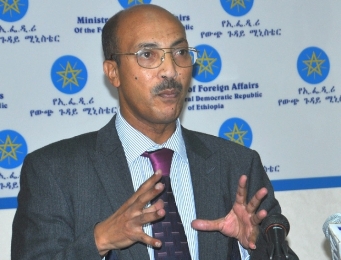IGAD unveils new process to end South Sudan crisis
March 11, 2015 (JUBA/ADDIS ABABA) – The Intergovernmental Authority on Development (IGAD) plans to resume peace talks between the South Sudanese warring parties next April, the Ethiopian foreign ministry said on Wednesday .

The new spokesperson of the Ethiopian foreign ministry Tewolde Mulugeta told a press conference held in Addis Ababa that the South Sudanese peace process will resume peace talks in the coming month of April but he didn’t determine a date.
Tewolde further said the two parties will continue their discussions with the presence of representatives from the African Union, United Nations Security Council, and the Troika countries : US, British and Norway.
In Juba, president Kiir’s spokesperson, Ateny Wek Ateny, said that IGAD leadership was in consultation with the heads of state and government in the region and internationally to adopt a new approach in the peace process so as to end the nearly 15-month old war.
“The prime minister of Ethiopia, who is the chairman of the IGAD is in consultation with the heads of state and governments to decide on the modalities to use because it seems the first approach did not work. So they want to try another model,” he told Sudan Tribune during an exclusive interview.
James Gatdet Dak, spokesman for the leader of the opposition faction of the Sudan Peoples’ Liberation Movement (SPLM-IO) also told Sudan Tribune that his leadership was also approached on the new mechanism.
“We have been approached since Monday by the IGAD mediation on the new mechanism,” he said when contacted on Wednesday.
Dak further revealed that the new “IGAD-plus” formula would likely be a multi-stakeholders mediation mechanism which also sought to include countries of Troika, European Union, United Nations and China.
Diplomatic sources say the mediation and the chair of the IGAD are considering a new formula involving all the regional and international countries and organisations that have a leverage on the two parties in order to accelerate the end of the conflict and the formation of a transitional government.
Ateny urged citizens of South Sudan to exercise patience and remain united towards consolidating a peaceful process as IGAD expands mediation.
“From the hints and through diplomatic interactions, there are indications that the IGAD would expand mediation to include South Africa and Tanzania so that they benefit from their approach,” he added.
Meanwhile Ann Itto, acting secretary general of the ruling Sudan People’s Liberation Movement (SPLM) allied to president Kiir also told reporters at a news conference on Tuesday that her SPLM faction and the government would continue to work for peace and stability of the young nation.
“While we also acknowledge the fact that our delegation did not come home from Addis [Ababa] with the peace agreement, without peace agreement has been disappointing. We are also aware of the daily challenges each family of South Sudan faces in finding food, in finding school fees in some areas where there are difficult humanitarian situations as a result of the war,” said Itto.
Dak said they welcome active participation of such countries and international organisations to assist IGAD in the peace process.
“Our leadership is committed to achieving a lasting peace in the country and would welcome a new approach which would ensure a meaningful peace agreement to end the conflict,” he added.
He said the government was trying to avoid federalism and reform agenda in the country, saying these were not “impossible demands” as rejected by the government, but they were critical issues towards achieving a lasting peace, good governance and prosperity in the country.
President Kiir and his former deputy in party and government turned rebel leader Machar failed to resolve the contentious issues in the peace process after days in direct negotiations in Addis Ababa, Ethiopia.
Itto however added that the ruling party “will continue to appeal to the South Sudanese people to remain patient, united and committed to the peaceful means of finding solution to what is affecting us while our government continues to engage the rebels with the aim of bringing peace to this country”, she stressed.
She further said her group had called for more time for the government to negotiate a peace agreement with the armed opposition.
Deputy foreign affairs and international cooperation minister, Peter Bashir Gbandi told Sudan Tribune that the government remained ready to resume negotiation with the rebels anytime IGAD calls for resumption.
“The government has agreed in principle to bring peace to the country and we will leave no door untouched and knocked. We will work with the region, the international community and everybody who has a role to play to help us reach a peaceful settlement of the conflict because we believe in dialogue than violence,” Gbandi explained.
The incumbent vice-president James Wani Igga said talks hit deadlock after the opposition raised nine impossible demands, including wealth and power sharing, the system of governance during the transitional period and the reintegration of forces.
But opposition figures also denied placing impossible demands and blamed the government for showing lack of interest in addressing the root causes of the conflict.
“The government bears complete responsibility for the collapse of the talks and the ongoing offensives in the country. They believe in violence as a way to resolve this conflict. This was why they attacked our forces in Wadakona, in Western Bahr el Ghazal and the current activities of their forces in Jonglei state towards the position of our forces there”, Ayii Ayii Akol, deputy head of humanitarian affairs committee with opposition said during an inclusive interview with Sudan Tribune on Wednesday.
IGAD is expected to inform the two warring parties to resume the peace negotiations once consultations are complete.
(ST)
